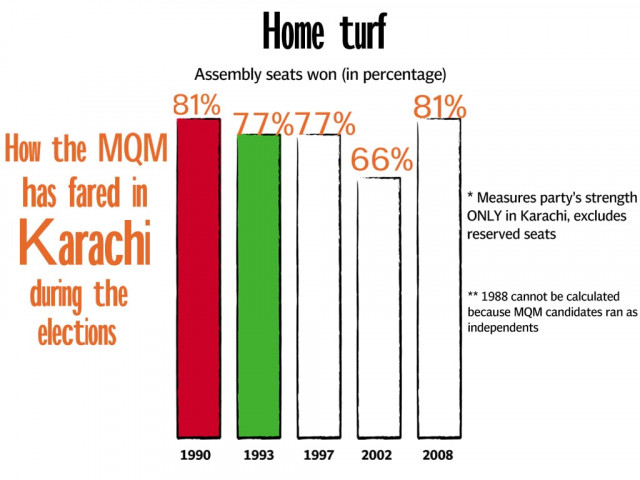The limitations of delimitation
The ECP will start redrawing Karachi’s constituencies most likely by the end of December.

The limitations of delimitation
Can the delimitation of Karachi’s constituencies also bring about a change in the political scenario of Pakistan’s largest city of some 20 million people? And will it be for better or worse? This has no easy answer, but many political forces are pinning their hopes on the Election Commission of Pakistan (ECP), which is likely to start by the end of December.
Karachi, which had seven National Assembly (NA) seats in 1970, has grown so much that its representation at the centre tripled to 20 seats by the 2008 elections. Indeed, the number of MNAs representing Sindh and hence Karachi may go up further if delimitation takes place after a census or population count.
Karachi’s major political party, the Muttahida Qaumi Movement (MQM), though not opposed to delimitation, wants it done after a census, which has not been held since 1998. It stands alone in this demand as parties such as the Awami National Party (ANP) and Jamaat-e-Islami (JI) have rejected this stance.
For its part, the JI is seeing delimitation as an important way for it to regain lost glory in Karachi in the next elections. The party was, thus, delighted with the Supreme Court’s October 6, 2011 order in the suo motu case for the ECP to undertake delimitation. The JI used to be part of the MMA that had helped it almost make a comeback in city politics when it won six seats in 2002. This, MQM leaders had conceded, has been a major setback for them since the party entered national politics in 1988.
The Pakistan People’s Party (PPP), who also has stakes in Karachi, would not mind fresh delimitation but insists, like the MQM, that this should be done after a census so that the number of seats should also be increased. The PPP has decided to support the MQM given their five-year coalition rule together in Sindh.
The PPP has been the second major force in Karachi since 1970, and despite having few seats it has considerable support, particularly on the outskirts of the city. Though the PPP won two out of seven NA seats and six PA seats from Karachi and took a major share in local government, city politics has never been its priority.
The ANP, which won two Sindh Assembly seats in 2008 (PS-93, PS-128) for the first time ever, believes it could cover more ground if the constituency boundaries were properly drawn. However, with the emergence of the Pakistan Tehreek-e-Insaf (PTI), the strong 2.5 million Pakhtun vote is likely to be divided in the next elections.
The Pakistan Muslim League-Nawaz has not much of a stake in Karachi, though they do have pockets of support from where they have and could win again.
These are the major political forces fighting for the “crown of Karachi”. Out of them, the MQM is the only force to have taken the maximum number of seats since 1988, followed by the PPP and JI.
Prior to the entry of the MQM, Karachi was the city of the JI, Jamiat Ulema-e-Pakistan and PPP. The JI won two local bodies elections, in 1979 and 1983, and they got to choose a mayor. The MQM won the local government polls in 1987, 1993 and 2005. The PPP has not been far behind and could have won the mayoral elections in 1979, had two of its councilors not been kidnapped. Thrice it has won deputy mayor seats and it held major towns in the post-Musharraf elections.
The next two months are crucial for this volatile city. The JI is going to aim to derail the MQM by allying with religious parties, followed by a possible accord on seat adjustments… either with the PTI or the PML-N. This is its only hope of getting NA and provincial assembly representation, as it has never won an election on its own. This explains why it has engaged both the PML and PTI at the national level.
It is important to analyse the historic background of the rise of the MQM as a powerful ethnic force in the name of Mohajirs and the subsequent political marginalisation of religious parties such as the JI and JUP in Karachi.
It would be interesting to see the “limitations of delimitation” and that too without a census. But it would be safe to wager that the MQM is still likely to emerge as the single largest party in the city despite any such changes.
The writer is the director of current affairs at Express News and has previously worked with ARY News.
Published in The Express Tribune, December 21st, 2012.


















COMMENTS
Comments are moderated and generally will be posted if they are on-topic and not abusive.
For more information, please see our Comments FAQ